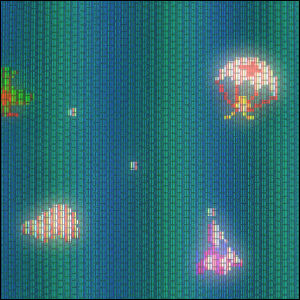 Konami introduces the arcade game Time Pilot in the United States, where it becomes one of the company’s more prominent sleeper hits. Time Pilot is also licensed to Atari in some regions.
Konami introduces the arcade game Time Pilot in the United States, where it becomes one of the company’s more prominent sleeper hits. Time Pilot is also licensed to Atari in some regions. ![]()

 Konami introduces the arcade game Time Pilot in the United States, where it becomes one of the company’s more prominent sleeper hits. Time Pilot is also licensed to Atari in some regions.
Konami introduces the arcade game Time Pilot in the United States, where it becomes one of the company’s more prominent sleeper hits. Time Pilot is also licensed to Atari in some regions. ![]()
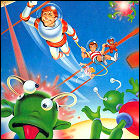 Telesys releases the video game cartridge Cosmic Creeps for the Atari 2600 home video game system, just in time for the Christmas buying season. A glut of new releases for the 2600 by the end of the year, many from third-party companies like Telesys, causes some consumer confusion which has unexpected consequences for the entire industry.
Telesys releases the video game cartridge Cosmic Creeps for the Atari 2600 home video game system, just in time for the Christmas buying season. A glut of new releases for the 2600 by the end of the year, many from third-party companies like Telesys, causes some consumer confusion which has unexpected consequences for the entire industry. ![]()
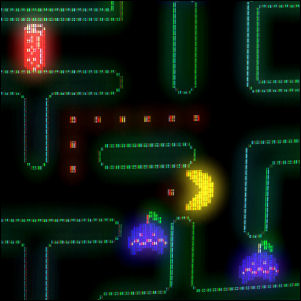 Still trying to stem the tide of bootleg copies of Pac-Man in American arcades, Midway releases the coin-op conversion kit Pac-Man Plus, offering arcade operators an inexpensive (and legal) way to “freshen” old Pac-Man machines on-site rather than turning to bootleg enhancement kits, a problem that has been stealing Midway’s market share since Pac-Man became a hit.
Still trying to stem the tide of bootleg copies of Pac-Man in American arcades, Midway releases the coin-op conversion kit Pac-Man Plus, offering arcade operators an inexpensive (and legal) way to “freshen” old Pac-Man machines on-site rather than turning to bootleg enhancement kits, a problem that has been stealing Midway’s market share since Pac-Man became a hit. ![]()
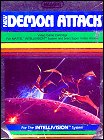 With exclusive rights to sell a home version of the cult arcade hit Phoenix under its belt, Atari sues third-party software house Imagic over its space shooter game Demon Attack, which is somewhat similar to Phoenix – too similar for Atari’s tastes. The two companies settle out of court the following January, with Imagic agreeing to omit the “mothership” level from the version of Demon Attack sold for the Atari 2600; the mothership appears in nearly every other edition of the game for other consoles and computers.
With exclusive rights to sell a home version of the cult arcade hit Phoenix under its belt, Atari sues third-party software house Imagic over its space shooter game Demon Attack, which is somewhat similar to Phoenix – too similar for Atari’s tastes. The two companies settle out of court the following January, with Imagic agreeing to omit the “mothership” level from the version of Demon Attack sold for the Atari 2600; the mothership appears in nearly every other edition of the game for other consoles and computers.
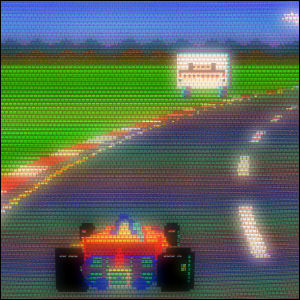 Japanese video game maker Namco releases Pole Position in the United States by way of American licensee Atari. Quickly gaining popularity in arcades, Pole Position marks one of the first “meta” moments in video games, featuring briefly-glimpsed billboards advertising other games by the same manufacturer.
Japanese video game maker Namco releases Pole Position in the United States by way of American licensee Atari. Quickly gaining popularity in arcades, Pole Position marks one of the first “meta” moments in video games, featuring briefly-glimpsed billboards advertising other games by the same manufacturer. ![]()
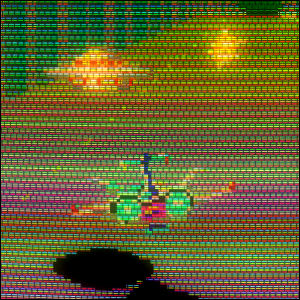 Sega releases the arcade game Buck Rogers: Planet Of Zoom in American arcades. Completely unrelated to the recent television series, the graphically impressive game is designed to be the first in a series, but no further games in the projected series ever materialize.
Sega releases the arcade game Buck Rogers: Planet Of Zoom in American arcades. Completely unrelated to the recent television series, the graphically impressive game is designed to be the first in a series, but no further games in the projected series ever materialize. ![]()
![]()
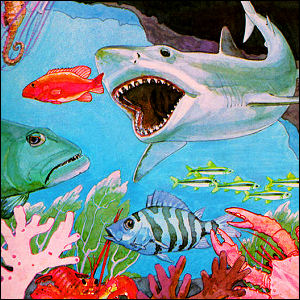 Mattel Electronics releases the Shark! Shark! cartridge for the Intellivision home video game system.
Mattel Electronics releases the Shark! Shark! cartridge for the Intellivision home video game system. ![]()
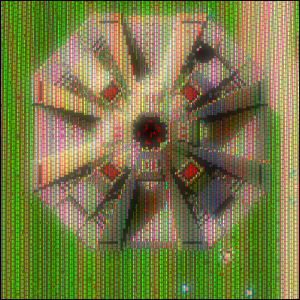 Atari releases the arcade video game Xevious, licensed from Namco, the Japanese developers behind Pac-Man.
Atari releases the arcade video game Xevious, licensed from Namco, the Japanese developers behind Pac-Man. ![]()
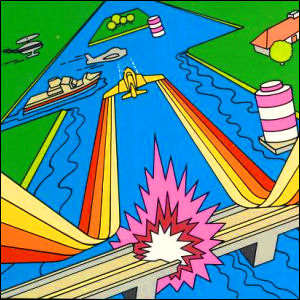 Activision releases Carol Shaw’s River Raid for the Atari VCS home video game system.
Activision releases Carol Shaw’s River Raid for the Atari VCS home video game system. ![]()
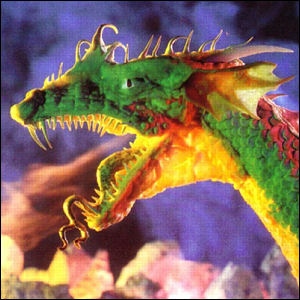 Activision releases Bob Smith’s Dragonfire for the Atari VCS home video game system.
Activision releases Bob Smith’s Dragonfire for the Atari VCS home video game system. ![]()
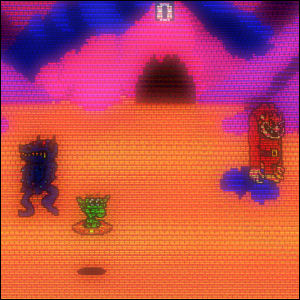 Midway releases the arcade video game Wacko, a game designed to defy having its cabinet converted into another game with a unique asymmetrical design.
Midway releases the arcade video game Wacko, a game designed to defy having its cabinet converted into another game with a unique asymmetrical design. ![]()
 Imagic releases the Dragonfire cartridge for the Intellivision home video game system.
Imagic releases the Dragonfire cartridge for the Intellivision home video game system. ![]()